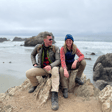Become a Creator today!Start creating today - Share your story with the world!
Start for free
00:00:00
00:00:01

Ep: 36: Motorcycle diaries - what are you running away from?
Stephy Steph and Bobby are back on the motorbikes on a cool and wet day in Dallas chatting life and running away from or running towards things. Check out this adventure!
Transcript
Introduction to Motorcycle Diaries
00:00:00
Speaker
Hey there guys, I'm Steppie South and this is Bobby and we are doing some motorcycle diaries today. Bobby, what are we talking about? You know, we're just, let's talk about just being alive and taking... We're just two dreamers out here dreaming. Well, we're dreaming. This is Dallas. We're riding around. It's kind of between raining episodes.
Chemistry and Community of Coffee
00:00:24
Speaker
We're looking for a coffee shop.
00:00:26
Speaker
Yeah, we love coffee. You know, coffee is interesting. There is so much chemistry behind it. There's so much of a rich history. Coffee gives people a chance to sit around and it's a stimulant and it fosters community and conversation. Boom. There you go.
Life Without Alcohol
00:00:46
Speaker
We're kind of trying to pull away from alcohol, right? We're not like,
00:00:52
Speaker
It's not that we don't have a beer every now and then or a glass of wine, but it's really nice when you don't need to have alcohol. You got a car on your right there, Steph. But, you know, what's on your mind right now on motorcycle diaries, Steffi? Well, whenever we're around the lake, it's hard not to think of running and all of the stuff that comes with that.
00:01:18
Speaker
ties into what we, you know, you and I were just talking about where it's, you know, kind of talked about, you know, when's the first time you took a good hard look at yourself.
Running and Self-reflection
00:01:29
Speaker
And we had interviewed Dr. Brett Kessler, president elect of the ADA recently in Chicago. And he was talking about running an endurance sport. And my comment was that, you know, you can run away from your problem.
00:01:44
Speaker
And that was probably an easy description for me, even though running helped me with school and kind of just had my attention in school and kept me out of some bad stuff, I didn't have to develop in other ways because I was good at running. And so it allowed me to hide and mask some of the
00:02:13
Speaker
I don't know, just some of the critical moments growing up that I think people tend to encounter when they don't have a championship to hide behind or they don't have a early athletic success in the capacity that I had it.
Running Away or Towards?
00:02:32
Speaker
So right now, are you running away from things or running towards a solution? Oh, I would say I'm blundering through things right now. Blundering? That's kind of the story of my life. I, you know, we did that Peru hike up the Inca Trail to Machu Picchu. And my intent was just to enjoy that kind of long, arduous journey. Yeah. And I was a little bit scared.
00:03:00
Speaker
But you know what, it worked out well. And I learned you can do almost anything with little baby steps.
Focus Required in Motorcycling
00:03:08
Speaker
We are actually standing on the motorcycles right now. It feels absolutely amazing. We've got to get another motorcycle journey planned out. It's getting to be the fall here. We're actually having some cool coming into Dallas. Watch this car up here. Left no signal. Watch right.
00:03:28
Speaker
One of the things I love about motorcycles, and part of perhaps what's kind of cool to try to share on this diary, with motorcycles, you have to have full attention at all times. Or really bad things will happen. Well, it helps, yes. And, you know, you can have the slightest little thing. You got to look at road surfaces. You've got to look at vehicles all over the place.
00:03:56
Speaker
It's dangerous as all get out. You know, why do you ride motorcycles again, Steph?
Living in the Moment
00:04:05
Speaker
I think, as I blunder through things, it was an easy way to... Add to the blundering? Yeah. It was an easy way just to manage your motion. Really? Recycling's a nice relief, and you don't have to do any kind of physical activity to get a real kind of rush. And it's...
00:04:26
Speaker
It's a dangerous choice and a lot of stuff on a motorcycle ride is out of your control, but it forces you to pay attention. We were dropping off. I had one motorcycle getting maintenance and we dropped off my other one and my other one needed a new back tire and the roads were wet and we were coming up a hill and gave it some gas and I fishtailed on the motorcycle.
00:04:54
Speaker
And that was kind of my big cruise with a heavy one. And that got my attention. Motorcycles will get your attention. They say, you know, live like you're, live like you're dying. And maybe that's a little dramatic on this, but you feel, you definitely feel alive when you're riding a motorcycle. It's nice because the more you live in the moment, the more alive you feel and the more sensations you're feeling.
Decision-making vs. Spontaneity
00:05:23
Speaker
And so that's what bringing it back to cycling or motorcycling, it forces you to pay attention and live in the moment. It's similar to running, which is kind of the same mechanism because you're hurting a lot. We just saw two chaps on a tandem bike. You get a chance to really unlock a subconscious part of your brain and really process some stuff.
00:05:52
Speaker
I'm going to go left-hand lane here. We're crossing a bridge at White Rock Lake in Dallas and we've had heavy rains and the rain is just kind of pouring down that, I don't even know what that thing is, a little way or something like that. I do a really bad job to kind of enjoying that journey or just living in the moment. That's what I was trying to say. Do you do well living in the moment, Steph?
00:06:22
Speaker
I think when I'm running and on a motorcycle I do. You know, you actually do a really good job as far as you're just, you know, you're the kind of person that says, you know what, I'm not going to overthink X, Y, or Z. Let's just get in there and we're going to be okay. For an embarrassingly, like, large amounts of decision making, I do that.
00:06:45
Speaker
Because I just, I don't know, I've got the, I've got confidence to say, hey, I know I can handle that, but there is a lot of things, like big decisions that I will stew over. I'll ruminate on, you know, minor social encounters that I'm like, oh man, I should have said this, and I didn't say that, and I wanted to, and if I just had that moment back, I would have said it this way. So I ruminate a whole heck of a lot.
00:07:12
Speaker
but on the you know for like an adventure or when I feel super duper safe and secure there's not much I you know I can't do and and that's where that flippancy comes from that's where that hey let's just figure it out comes from it's fun I'm a fun sucker sometimes yeah I gotta look I gotta look at the weather I gotta you know yeah it's definitely two different ways to go about go about things I think the I think the devil's into details and
00:07:43
Speaker
Better watch your fish tailing capabilities there.
Passions and Focus
00:07:46
Speaker
Yeah, no joke. No joke. It's just nice to... That's where your passion comes in. I had lunch with a doc recently and she was saying, you know, she's like, Steph, you're passionate about so many things. And so it's tough really to talk about a single passion. And she had gone to this... Losing weight.
00:08:09
Speaker
She had gone to this executive education series in California. It's over six months phenomenal program through Glidewell Labs. She was saying, I talked about, they asked you, who do you want to impact?
Broad Goals and Public Policy
00:08:27
Speaker
There was a lot of people there that was like, I want to change the world. I want to do all of this good. They teach you here, you really need to narrow it down.
00:08:38
Speaker
Not to say you won't change the world, but if you water down your message or if you try to do all of it in one big expansive scale, no one really changes the world that way. We had a talk with a leader fairly recently and we talked about that issue. They had quite a few goals that they kind of set out to accomplish.
00:09:07
Speaker
It reminded me of when I was doing my public policy fellowship, we had the guy who was, I think it was Chief of Staff for Jimmy Carter. And he just said, we had way too many goals and we lacked concentration and we were trying to do everything. And we ended up not being able to do very many things.
Open-minded Argumentation
00:09:29
Speaker
And Think Again by Adam Grant, the book that talks about
00:09:34
Speaker
We've got to do a book review on that. We've got to do it. It's a great book. Just to further emphasize the point, they talk about debate strategies. When you're trying to bolster, when you say something, you want people to think that way or you want people to acknowledge your point, if you start to give supporting arguments, one
00:09:57
Speaker
Really good supporting argument is far better than having two great supporting arguments and one really bad one. Because what happens when you throw that last one in there just because you want to fill space or you think you need a, you know, one more argument, if you put a bad argument in there, it's going to negate your entire point because it's an access point for someone to easily pick at and debunk.
00:10:24
Speaker
After you read that book, I'm going to go, I'm going to go. What, what did you have to rethink or what did you choose to rethink after reading that book? Is there anything you're reading this and you're like, oh my gosh, I got to. Yeah, it talks about kind of when people are like, just like we're doing right now, when people are talking and thinking, they go into three different modes. It's either professor, preacher or politician.
00:10:55
Speaker
And the professor has a, you know, it's been a minute. I want to mix these up, but it's really important. I've kind of moved on to a different book at this point. But it talks about having evidence versus no evidence for what you're saying. And it talks about, you know, how you construct an argument or just kind of a way of thinking.
00:11:22
Speaker
and how easily someone's going to change their mindset based on whether they're in their professorial mode, their preacher mode, or their politician mode. And it's tough because one of the aspects of being in a politician mode is there's no evidence. It's all about charisma. So if you're trying to debunk somebody with evidence but they're a great politician, you may not win that one.
00:11:51
Speaker
The best thing is to have a scientific mind and to be open to being wrong. When scientists are wrong, say they do an experiment, it's a good thing because we still learn something. But if you don't have a scientific mind, being wrong in society, political science, isn't as great.
00:12:19
Speaker
And what I would say is that's one of the things I think we've lost in our discourse is, watch right, watch right, the ability for people to have different types of interaction. And I think we've seen that in the past couple of years. People can't disagree. There was something I, wasn't there something this morning that I was reading out of Harvard Business Review? It was storytelling and, or no, sorry, you're reading the two thumbs, two opposing thumbs.
00:12:49
Speaker
Right, Cisco and Ebert. And these guys could agree completely. I'm going to go. I'm going to go. I'm going to go. We're crossing a road here. That's one of the things with motorcycles. But so back to my initial question of, is there something you looked at and said, I need to, I think, this way? Yeah, basically you want to be OK saying you're wrong. You want to be open to being wrong because that means that it doesn't mean the other person is right.
00:13:18
Speaker
or will be right all the time. It just means that you recognize there's something there that maybe was not consistent with your previous way of thinking.
Knowledge Evolution and Change
00:13:28
Speaker
Yeah. One of the things, you know, I've got boys that are kind of around the age of 20 and I made a lot of mistakes as a parent.
00:13:40
Speaker
One of the things that I think helped me or one of the things I think I did well was apologizing to my boys if I was wrong. And there were lots of times I was wrong. And I remember just conversations and I, you know, they were quite shocked that maybe it's they wanted to do something specific. And I said, no, that's not a good idea.
00:14:10
Speaker
And then it turned out that, yeah, you know what? They actually should do XYZ. Well, unthinking, rethinking, change in your mind, admitting when you're wrong, that's all tough stuff to do. Any other final comments as we wrap it up, Steffi Steph? On the note of being more okay with being wrong,
00:14:33
Speaker
When you look at all of our knowledge collectively as humans, what we have, like all the knowledge that we have, you know, what is it to know a fact and how quickly does that fact become irrelevant? Think of how many people believed that the Earth was flat and how wrong that would be knowing what we know now.
00:14:59
Speaker
And then you fast forward so many years and how many people believe that you could never put a man on the moon kind of thing. You could never go into outer space and how wrong that is now. So the concept of being right is so temporal. It's relative.
00:15:23
Speaker
consistent with the knowledge bank that we have today, it doesn't mean that next year or in the next moment that would be right as well.
Embracing Change and Growth
00:15:32
Speaker
So it's not about being wrong necessarily, but it's about being more about being open-minded. Yeah. Just let me know when you're across in here. And understanding as humans, we only know in the moment what's in front of us. Yeah. And so it's okay to be wrong and actually talk about this in this book,
00:15:54
Speaker
is that if you are the same person with the same knowledge bank next year as you were the previous year, it's a wasted year. You have failed. That's right. Information will constantly be changing around you. You need to have, we always joke, we say, you know, Bob 2.0 or Steph 2.0 or new Bob or new Steph. Are you on a 2.0? I didn't think you, I thought we're still
00:16:19
Speaker
Did you hear a revision? You're OG. Alright, you're OG. So on that point, I think sometimes, especially when you are on a team that you've been on, they might criticize you for inconsistency. And there is something to be consistent, but I'll also argue the fact that you have every right to change.
00:16:42
Speaker
and it's okay to walk into your team or office or whatever one day and just say, hey, this is something I'm trying new and this is how I'm going to be and it's how I'm going to act. And as we've talked about before, if you're the same person when you're 25 versus 30 versus 35 versus 40,
00:17:04
Speaker
Something's wrong. Now, you're going to maintain some characteristics. But anyways, well, I guess to wrap up this episode, we're going to push you. We push people. What would be the message to say, push to be open to change, push to be an open to be wrong? I would just say be open minded and always know that what you know today may not be true tomorrow.
00:17:29
Speaker
Cool. I love it. Well, listen guys, if you love what we're talking about, please hit the subscribe and thanks for joining Motorcycle Diaries.

















